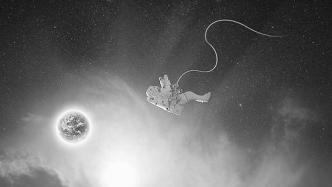
Life in space is not "easy" for astronauts, and it has been found for decades that astronauts' immune systems are suppressed in space, making them more susceptible to illness. But the mechanism behind the above-mentioned immune system disorders has been a mystery.
A study published Sept. 12 in Frontiers in Cell and Developmental Biology unravels the mystery. Rocky An, an undergraduate student with a double major in biological and mechanical engineering at Cornell University, has discovered that the transcription factor MRTF may be a multiscale mechanobiological approach to solving the dysfunction of macrophages (key cells in the body's immune response) in astronauts in space the missing link.
An reviewed the literature on macrophage behavior in space over the past 20 years, as well as recent research on how macrophages respond to forces in normal gravity.
"I've been thinking about how the relevant research data are presented. Two of the papers are very important, a review on how macrophages are suppressed in microgravity, and a review on the mechanobiology of macrophages Research. I linked the two papers to generate the ideas in my research," An said.
In the absence of gravity in space, immune cells change shape. Scientists suspect changes in the cytoskeleton are related to immune system disorders. Recent studies in normal gravity conditions have shown that interfering with the cytoskeleton of macrophages reduces the transport of a specific protein, a transcription factor important for immune responses, to the nucleus.
By comparing studies of cells in microgravity, analyzing relevant study patterns and timescales, An found that the transcription factor MRTF may be the culprit in immune system disorders.
"I think MRTF is an important factor in immune system problems, and this may be the first step in space immunotherapy," An said.
In the research paper, An noted that MRTF may also be related to astronauts' cardiovascular health stress, and emphasized the need for further research into other factors that may play a role in immune system disturbances, which could help understand how MRTF interacts with giant astronauts in microgravity. Phage-nucleus interactions.
An's ability to write papers independently as an undergraduate relies on his previous "opening" research accumulation. In his thesis, he thanked the professors at Cornell University, and said that he had benefited a lot from the professors and their teaching methods. Through laboratory and project team research, he had gained many opportunities to study independently and ask questions.
Before attending Cornell, An had contact with the lab of Theodore Clark, a professor of microbiology and immunology in the school's School of Veterinary Medicine, and has been doing research there since enrollment.
During the 2021 summer internship, An was selected as a research assistant in NASA's Space Life Sciences Training Program, where he studied the effects of microgravity on cells and co-authored his first paper on microgravity. Optimization of the Research Cell Modeling Framework under Gravity.
In the summer of 2022, he was engaged in research in the field of mechanoimmunotherapy as an "Amgen Scholar" at the Wise Institute of Harvard University, exploring methods of treatment by manipulating cellular structures.
"I've always been interested in cells, cell mechanics. It's new and very different from what is usually learned in biology. I really like the collision between the two fields," An said.
Related paper information:
https://doi.org/10.3389/fcell.2022.997365
(Original title "Undergraduates Reveal Mechanism of Astronaut Immune System Disorders")